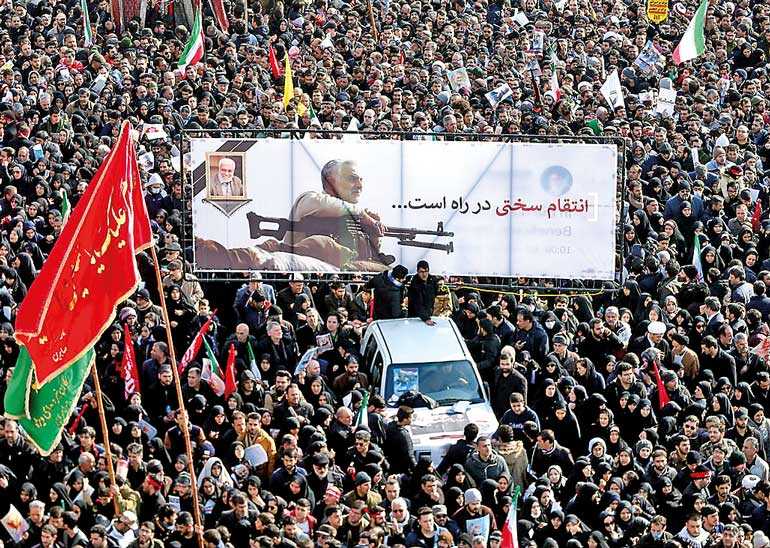Tuesday Feb 24, 2026
Tuesday Feb 24, 2026
Tuesday, 7 January 2020 00:00 - - {{hitsCtrl.values.hits}}

Iranian people attend a funeral procession for Iranian Major-General Qassem Soleimani, head of the elite Quds Force, and Iraqi militia commander Abu Mahdi al-Muhandis, who were killed in an air strike at Baghdad airport, in Tehran, Iran– Reuters
DUBAI/WASHINGTON (Reuters) - Hundreds of thousands of Iranians thronged Tehran’s streets on Monday for the funeral of military commander Qassem Soleimani, killed by a US drone strike, and his successor promised to drive US forces out of the region in revenge.
The coffins of Soleimani and Iraqi militia leader Abu Mahdi al-Muhandis, who also died in Friday’s attack in Baghdad, were passed over the heads of mourners chanting “Death to America”.
The killing of Soleimani, the architect of Iran’s drive to extend its influence across the Middle East, on the orders of US President Donald Trump has stoked concern across the globe that a broader Middle East conflict could erupt.
Trump has listed 52 Iranian targets, including cultural sites, that would be hit if Iran retaliates with attacks on Americans or US assets.
“I promise to continue martyr Soleimani’s cause as firmly as before with the help of God, and in return for his martyrdom we aim to get rid of America from the region,” said General Esmail Ghaani, the new commander of the Quds Force, the elite unit of Iran’s Revolutionary Guards charged with overseas operations.
“God the Almighty has promised to take martyr Soleimani’s revenge. Certainly actions will be taken,” he told state television.
Other political and military leaders have made similar threats without offering specifics. Iran, which lies at the mouth of a Gulf oil shipping route, has a range of allied proxy forces in the region through which it could act.
The size of the crowds in Tehran, which state media said numbered in the millions, mirrored the masses that gathered in 1989 for the funeral of the Islamic Republic’s founder, Ayatollah Ruhollah Khomeini.
Soleimani was a national hero to many Iranians, even those who did not consider themselves supporters of Iran’s clerical rulers.
Iran’s long-standing demand that US forces quit the region gained traction on Sunday when Iraq’s parliament backed a recommendation by the prime minister for all foreign troops to be ordered out.
Iraq’s rival Shi’ite leaders, including ones opposed to Iranian influence, have united since Friday’s attack in calling for the expulsion of US troops. About 5,000 US military personnel are in Iraq, mostly acting as advisers.
Soleimani, seen as Iran’s second most powerful figure behind Khamenei, built up Iran’s network of proxy forces to create a crescent of influence stretching from Lebanon through Syria and Iraq to Iran. Allies also include Palestinian and Yemeni groups.
Prayers at his funeral in Tehran, which will later move to his southern home city of Kerman, were led by Iranian Supreme Leader Ayatollah Ali Khamenei, who wept as he spoke.